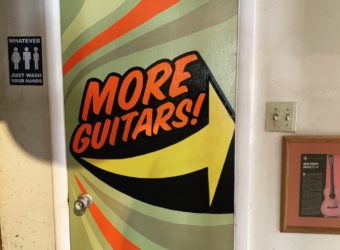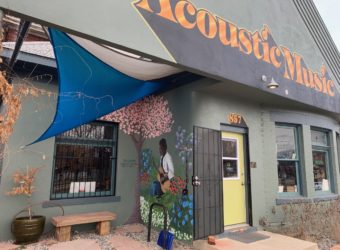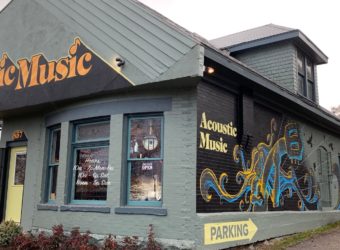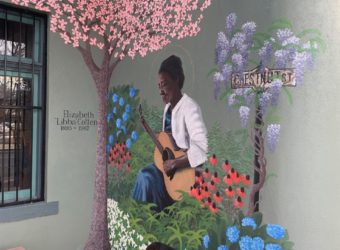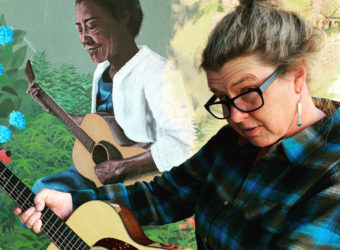
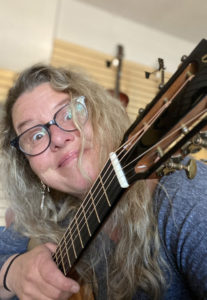 Acoustic Music SLC Owner Megan Peters keeps her doors, and her arms, open.
Acoustic Music SLC Owner Megan Peters keeps her doors, and her arms, open.
Salt Lake City’s Megan Peters has a guitar bench in the back of her Subaru. She’s been making deliveries, and the occasional repair on the fly.
“And if someone needs a re-string,” she laughs, “I’ll just pull up to their house after work. They can leave the instrument out front, I’ll do the job in my car and then put it back on the porch.”
Peters, a songwriter with four albums to her name, owns Acoustic Music SLC, serving a wide swath of “Crossroads of the West” musicians, ranging from stone beginners to serious working pros.
A player for over 40 years, personally she is a fan of “boutique guitars” and proudly runs her welcoming shop like, well, a boutique—“I still write paper receipts and have no computer system,” she says.
Despite the strange days of late, Acoustic Music is still open for business. She is running with a skeleton crew and is fanatically observing cleanliness and social distancing within the shop—even if the latter is a concept foreign to someone as open-armed as Peters, who gathers the homeless as well as the heeled under one understanding roof, with a simple philosophy that translates to ‘Let’s respect each other and play guitars.’
A committed knitter as well as picker, Peters carries a heavyweight array of big guitar names, but admits she’s mostly providing budget outfits to quarantiners at the moment.
“Oh my God, for sanity’s sake, people need guitars right now! I have an entire room full of Breedlove and Bedell, plus Collings, Santa Cruz, Martin and Taylor. I’ve got all this really high-end stuff, and what I can’t keep in stock are the $200 models. Folks just want to learn because they’re locked down!”
Owning Acoustic Music completes a circle for Peters. The store opened in 1973, and, as a youth, she actually purchased her own first six-string at the shop.
“The store was three blocks away from my junior high,” she says, ”and I’d go there every single day. I had a $300 guitar on layaway that took me probably a year-and-a-half to pay off, but it was a place where the dudes treated me like I was one of the tribe. I could sing Bonnie Raitt songs really loud as a little 12-year-old, and they’d listen for a while before they’d kick me out with a friendly ‘see you tomorrow, Meg!”
With four athletic siblings, Peters, the self-professed “fat kid in a skinny family,” just wanted, “to read books, play guitar, wear black eyeliner and hang out in the drama room.”
At Acoustic Music, which retains a dedicated classical guitar section, she found a safe haven. As the store’s fourth owner, she wants to keep it that way, and is adamant about being an outpost for “others” in a conservative town.
“It’s really important to the community,” she says. “It’s a hangout space.”
To keep herself sane while staying home, Peters, along with longtime associate and luthier Aaron Jones, has been hosting a weekly Virtual Song Circle Challenge on her FaceBook page, celebrating great writers such as Hank Williams, Gillian Welch and Dolly Parton, while giving outlet to creative souls from all around the country, not just around the block.
“Amidst all this, to be able to go on your phone and listen to a father and daughter sing a Neil Young song is magical,” she beams. “It makes me so happy.”
Peters, who says, “There is no Megan without a guitar around,” is an important Breedlove USA dealer and loves the instruments that come out of Bend.
“With each Made in Bend Breedlove, it feels like the builder is paying attention to that individual guitar and getting the most out of that specific wood that he or she can.”
Peters was raised in a “completely green family”—“I never had meat until I was 16.”
She says that Breedlove owner Tom Bedell’s recent TEDx Talk about forging a path to sustainability in the guitar world has had a profound effect on her outlook, which she has been sharing with Acoustic Music SLC customers.
To have somebody ask, “Where did the wood in your guitar come from?” was challenging, she says.
“I’ve always considered the art of the instrument, but to actually consider the wood has definitely made me think differently.”
“My customers do care, and I think that we need to educate them about sustainability and we need to educate ourselves about whether other brands are making similar efforts—no clear cutting, selective salvage and harvest—or not.”
“What Tom said means a lot me—if we want guitars to be around in 100 years, we’re going to have to take care of the forests that make them.”

